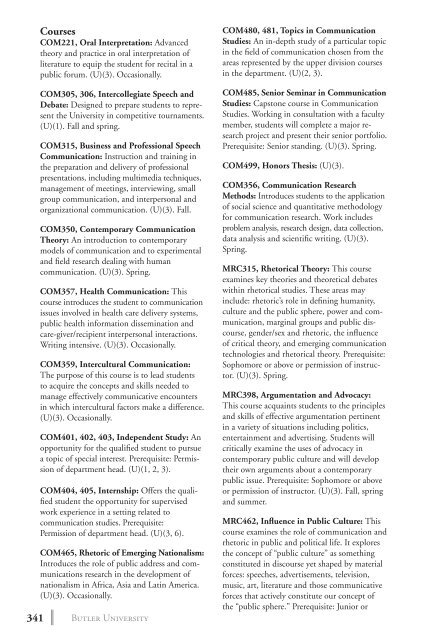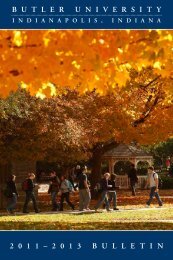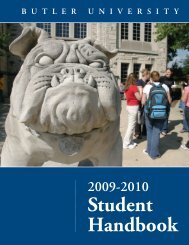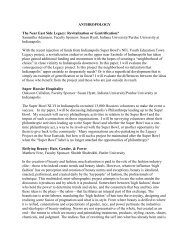College of Communication - Butler University
College of Communication - Butler University
College of Communication - Butler University
You also want an ePaper? Increase the reach of your titles
YUMPU automatically turns print PDFs into web optimized ePapers that Google loves.
341<br />
Courses<br />
COM221, Oral Interpretation: Advanced<br />
theory and practice in oral interpretation <strong>of</strong><br />
literature to equip the student for recital in a<br />
public forum. (U)(3). Occasionally.<br />
COM305, 306, Intercollegiate Speech and<br />
Debate: Designed to prepare students to represent<br />
the <strong>University</strong> in competitive tournaments.<br />
(U)(1). Fall and spring.<br />
COM315, Business and Pr<strong>of</strong>essional Speech<br />
<strong>Communication</strong>: Instruction and training in<br />
the preparation and delivery <strong>of</strong> pr<strong>of</strong>essional<br />
presentations, including multimedia techniques,<br />
management <strong>of</strong> meetings, interviewing, small<br />
group communication, and interpersonal and<br />
organizational communication. (U)(3). Fall.<br />
COM350, Contemporary <strong>Communication</strong><br />
Theory: An introduction to contemporary<br />
models <strong>of</strong> communication and to experimental<br />
and field research dealing with human<br />
communication. (U)(3). Spring.<br />
COM357, Health <strong>Communication</strong>: This<br />
course introduces the student to communication<br />
issues involved in health care delivery systems,<br />
public health information dissemination and<br />
care-giver/recipient interpersonal interactions.<br />
Writing intensive. (U)(3). Occasionally.<br />
COM359, Intercultural <strong>Communication</strong>:<br />
The purpose <strong>of</strong> this course is to lead students<br />
to acquire the concepts and skills needed to<br />
manage effectively communicative encounters<br />
in which intercultural factors make a difference.<br />
(U)(3). Occasionally.<br />
COM401, 402, 403, Independent Study: An<br />
opportunity for the qualified student to pursue<br />
a topic <strong>of</strong> special interest. Prerequisite: Permission<br />
<strong>of</strong> department head. (U)(1, 2, 3).<br />
COM404, 405, Internship: Offers the qualified<br />
student the opportunity for supervised<br />
work experience in a setting related to<br />
communication studies. Prerequisite:<br />
Permission <strong>of</strong> department head. (U)(3, 6).<br />
COM465, Rhetoric <strong>of</strong> Emerging Nationalism:<br />
Introduces the role <strong>of</strong> public address and communications<br />
research in the development <strong>of</strong><br />
nationalism in Africa, Asia and Latin America.<br />
(U)(3). Occasionally.<br />
<strong>Butler</strong> <strong>University</strong><br />
COM480, 481, Topics in <strong>Communication</strong><br />
Studies: An in-depth study <strong>of</strong> a particular topic<br />
in the field <strong>of</strong> communication chosen from the<br />
areas represented by the upper division courses<br />
in the department. (U)(2, 3).<br />
COM485, Senior Seminar in <strong>Communication</strong><br />
Studies: Capstone course in <strong>Communication</strong><br />
Studies. Working in consultation with a faculty<br />
member, students will complete a major research<br />
project and present their senior portfolio.<br />
Prerequisite: Senior standing. (U)(3). Spring.<br />
COM499, Honors Thesis: (U)(3).<br />
COM356, <strong>Communication</strong> Research<br />
Methods: Introduces students to the application<br />
<strong>of</strong> social science and quantitative methodology<br />
for communication research. Work includes<br />
problem analysis, research design, data collection,<br />
data analysis and scientific writing. (U)(3).<br />
Spring.<br />
MRC315, Rhetorical Theory: This course<br />
examines key theories and theoretical debates<br />
within rhetorical studies. These areas may<br />
include: rhetoric’s role in defining humanity,<br />
culture and the public sphere, power and communication,<br />
marginal groups and public discourse,<br />
gender/sex and rhetoric, the influence<br />
<strong>of</strong> critical theory, and emerging communication<br />
technologies and rhetorical theory. Prerequisite:<br />
Sophomore or above or permission <strong>of</strong> instructor.<br />
(U)(3). Spring.<br />
MRC398, Argumentation and Advocacy:<br />
This course acquaints students to the principles<br />
and skills <strong>of</strong> effective argumentation pertinent<br />
in a variety <strong>of</strong> situations including politics,<br />
entertainment and advertising. Students will<br />
critically examine the uses <strong>of</strong> advocacy in<br />
contemporary public culture and will develop<br />
their own arguments about a contemporary<br />
public issue. Prerequisite: Sophomore or above<br />
or permission <strong>of</strong> instructor. (U)(3). Fall, spring<br />
and summer.<br />
MRC462, Influence in Public Culture: This<br />
course examines the role <strong>of</strong> communication and<br />
rhetoric in public and political life. It explores<br />
the concept <strong>of</strong> “public culture” as something<br />
constituted in discourse yet shaped by material<br />
forces: speeches, advertisements, television,<br />
music, art, literature and those communicative<br />
forces that actively constitute our concept <strong>of</strong><br />
the “public sphere.” Prerequisite: Junior or

















